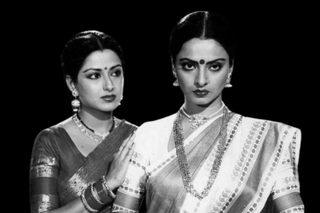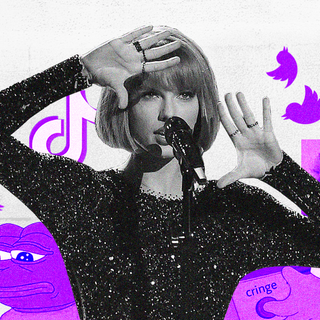
Woe Is Me! “Other Women Are Always Competing With Me. What Am I Doing Wrong?”
A series in which The Swaddle team indulges your pity party with advice you’ll probably ignore.

Woe Is Me! is a series in which The Swaddle team indulges your pity party with advice you’ll probably ignore.
“I feel other women are constantly in competition with me. I find it difficult to appreciate other women out loud even if they do something good, while it is easy for me to appreciate men. I don’t find topics to talk about with other women as I feel I am not a “girly” girl. I cannot find interesting topics to talk about with other women and the conversations get stuck. I am straight, and a female both emotionally and physically. Is catfight real? Or are girl friendships difficult?”
— In search of a bestie
SM: Firstly, you’re not the only person who feels this way. A few friends in the past too have told me about how they found it difficult to be friends with women, and get along much more easily with men. That’s not a bad thing in and of itself. However, since you specifically mention feeling competitive with other women and finding it difficult to appreciate them, I think it’s important to think through how much of that comes from conditioning. Growing up, a lot of the time we internalize messaging around girls not getting along and always getting into catfights. But here’s the thing: “girl friendships” can be really wonderful and nurturing, and in fact, relationships with any people which we pursue despite instinctive biases, almost always do, in my experience turn out to be especially rewarding. So, maybe you can make a special effort to work against your instincts, and try and see how that changes your approach over time. Compliment a woman out loud, start a conversation, and team up to pursue something you like together.
RN: I won’t say the thing that you probably might hear a lot: internalized misogyny. Okay, I said it, but with that out of the way let’s get to the heart of this. I don’t blame you for what you’re feeling or thinking. Many of us have been here — I know I have. You feel other girls compete with you, and I’m going to go out on a limb and say that perhaps it is true, with the added caveat that you are competing with them too, without your knowing it. Under the pressure of mainstream feminism where women have to love all other women unconditionally, we’ve forgotten to address the ways in which patriarchy pits us against one another. So you may be right in sensing the competition, but the beautiful thing about recognizing the workings of patriarchy is understanding that even the “girly” girls aren’t at all similar to one another, and the “competition” is more exaggerated than it may appear. In other words, you may not be like them, but they aren’t a giant monolith made up of eerily similar factory-made GirlsTM either. This is what you’ve been socialized to think, and the capitalist takeover of femininity means that the experience of girlhood appears, at first glance, to be limited to things you may find shallow — clothes, make-up, and so on. Our social scripts dictate that these are the most visible aspects, the first layers of conversation even. But beyond these caricatures, there is so much more to women that you will discover if you just take the time to stick around a little more and wait for the layers to peel back. If you’re not seeing it yet, it’s because they don’t trust you either, and that could be because of the superiority complex you seem to be exuding. My advice is to introspect and allow yourself to sink into the joys of female friendships beyond what meets the eye at a distance. To answer your last question: girl friendships being difficult is what the patriarchy tells us. What it doesn’t tell us is that they’re absolutely worth it. Get closer, get comfortable, and there is a world of emotional complexity (which is to say, richness), intimacy, laughter, and love that awaits.
DR: Is it, perchance, possible that you’re simply projecting when you think other women are trying to compete with you? The fact that you find it difficult to cheer women on, but don’t seem to struggle the same way with men, hints strongly towards the possibility that it might be you who is constantly trying to outdo your fellow women — and not the other way round.
Also, I could be completely wrong here, but when you say you’re not a “‘girly’ girl,” it makes me wonder if you believe you’re better than other women. If that’s indeed the case, I’m sorry to say that you might be suffering from a case of internalized misogyny.
Alternatively, do you think there’s any possibility that you might be attracted to women — be it sexually, or even just romantically — and you’d rather believe in imagined rivalry to stop yourself from admitting that you can’t talk to them because you’re flustered. I don’t want to presume anything, so let me ask you this: do you think the notion of this imaginary competition helps you keep other women at bay so you don’t end up acting on your feelings? Growing up in a heteronormative society can, at times, prevent us from questioning our sexuality; we may end up assuming we’re straight, and then do our best to ensure that the version of “reality” we’ve chosen to believe in, isn’t challenged because that can make us feel lost, rudderless. Since you deemed it relevant to mention your sexual orientation, I wonder if it was a subconscious attempt on your part to remind yourself that you’re straight because the alternative worries you — and in a society as conservative and homophobic as ours, that’s understandable.
Why you think women are your enemies is something only you can figure out; introspection would be a good place to begin.
AS: I feel like this is one of those “not like other girls” memes that have come to life. It exemplifies this idea that, sometimes, even those who identify as women have a specific narrow idea of what womanhood is. Accordingly, some of us don’t resonate with ‘other women.’ But here’s the thing — the pressure to be “girly” (or not “girly”) or the idea that women can’t get along is a result of gendered conditioning, that we’ve all ended up internalizing. Whether you’re a woman, or what kind of woman you are, is up to you and only you. So, my suggestion would be to try and remove these mental barriers about whether your version of womanhood matches the “norm” of other women. Perhaps, if you’re able to look beyond this, it will ease the difficulty you feel in keeping up conversations and friendships with other women.
Related


The Cultural History of Holding Hands
